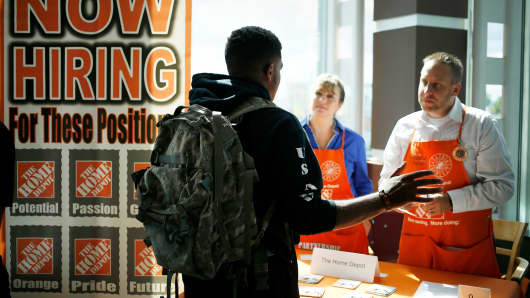Uncertainty about next month's election hasn't stopped most businesses from rolling out expansion plans and hiring new workers.
But about a third of them are having trouble filling open positions, according to a survey released Monday from the National Association for Business Economics.
Just 13 percent of respondents said their companies had postponed hiring or investment decisions until the November election, up 2 percentage points from the July survey, when NABE asked respondents the same questions.
Smaller businesses are feeling more cautious. While only 6 percent of large firms (those with more than 100 employees) have delayed decisions, nearly a quarter of smaller firms said they've held off on hiring or investing until the election is over.
No matter what the outcome of the election, companies report continued plans to cut capital spending on new plants and equipment.
About a third said they plan no significant new capital spending. The rest said they plan to invest in new product lines or markets. About a fifth plan to expand capacity for current products.
Spending was weakest in the goods-producing and services sectors, while spending rose for companies in transportation, utilities, information and communications industries. Spending was flat for finance, insurance and real estate companies.
Some 43 percent told the NABE survey that their firms had a hard time filling open positions during the third quarter, a slight increase from the last survey in July. More than a third told the NABE survey they're having trouble finding skilled workers to fill open jobs, also up slightly from July. The problem is greater in goods-producing industries than in the services sector.
But there were few reports of companies facing shortages of raw materials or equipment.
About a third of companies said they expect to add workers in the next three months, up a few percentage points from July.
Nearly half said they also expect to boost wages and salaries in the upcoming quarter. And nearly three-quarters said they don't see much impact from an increase in the minimum wage. Fewer than a quarter said a higher minimum wage would hurt profits or prompt them to cut back on hiring. Some 6 percent said any increase would help them recruit and keep workers.
The survey was conducted between September 20 and October 4, 2016, and the responses reflect third-quarter 2016 results and the near-term outlook.
The 104 responses came from a wide range of companies; 6 percent of panelists were from single-person firms; 15 percent from firms with 2-10 employees; 18 percent from firms with 11-100 employees; 14 percent from firms with 101-1,000 employees; and 46 percent from firms with more than 1,000 employees.
The group continues to have modest expectations for economic growth. Some 44 percent said they expect real gross domestic product to grow by 2 percent over the next 12 months; nearly half are looking for slower growth of between 1.1 percent and 2 percent.



